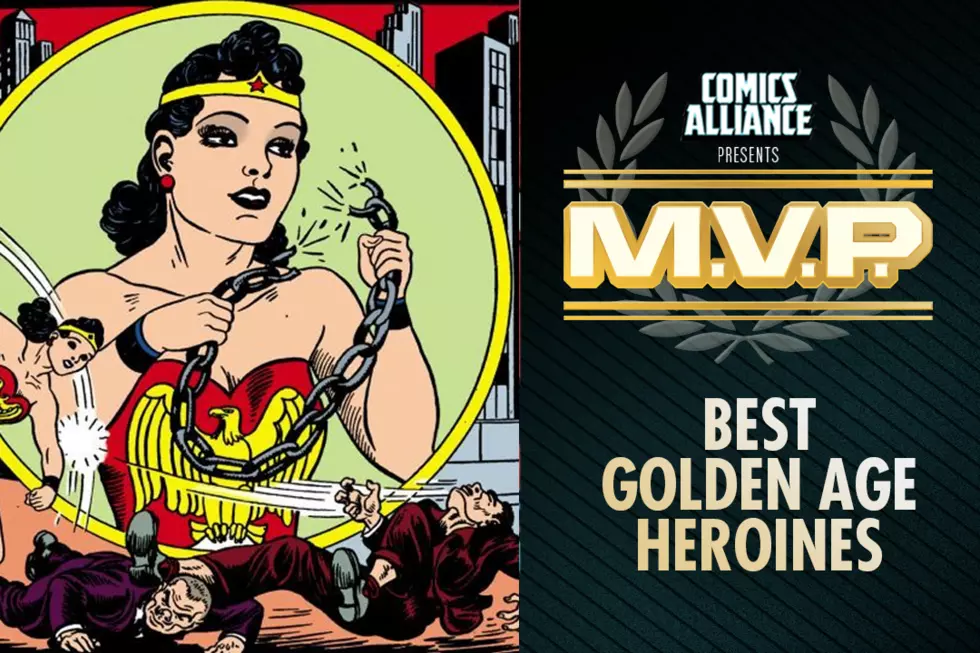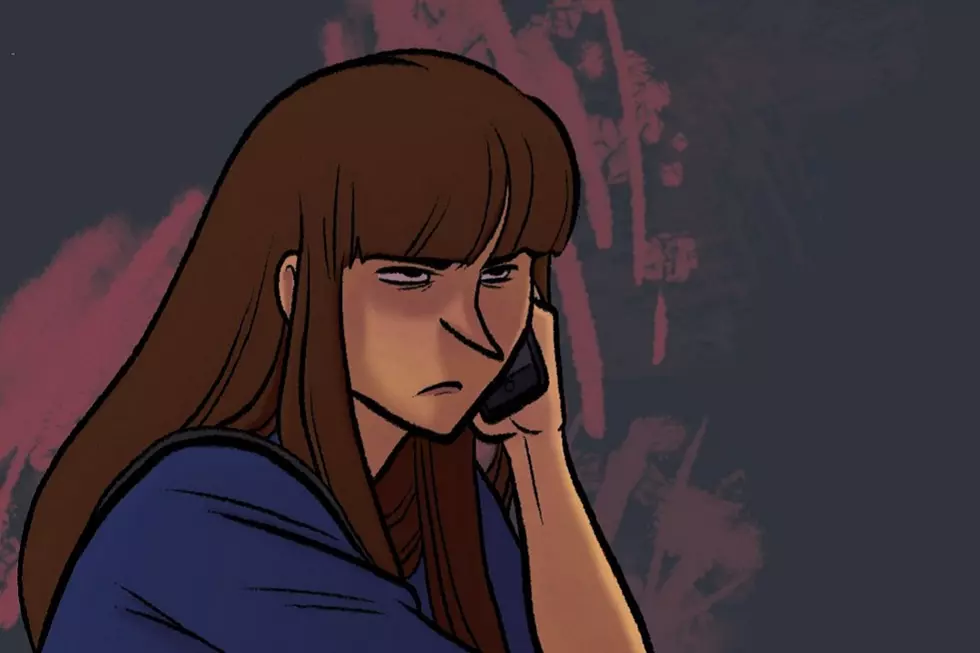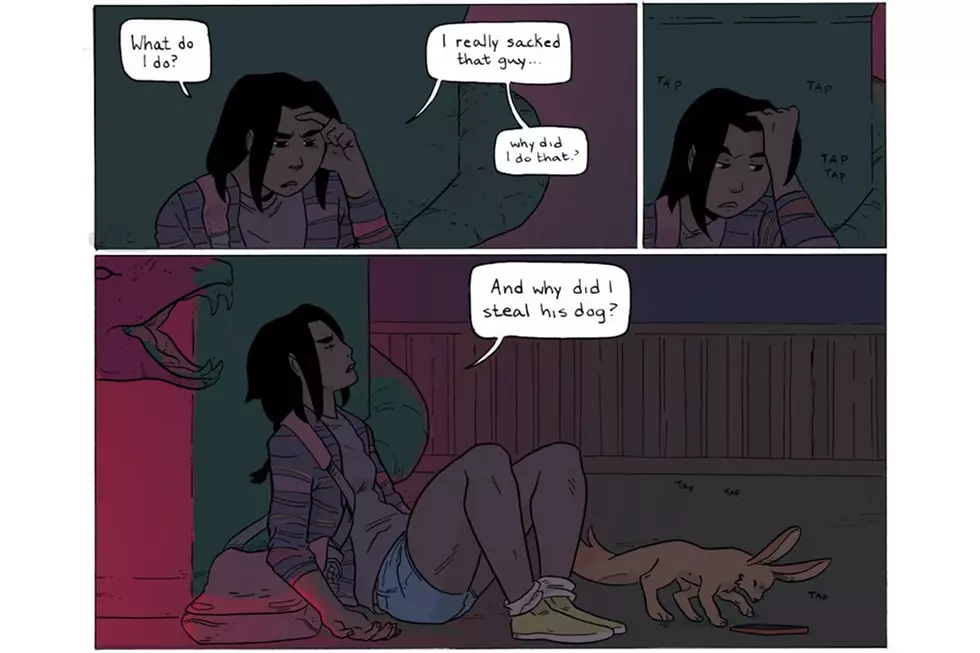
Sexual Harassment in Comics: The Tipping Point
Last week, when artist Tess Fowler got on Twitter and breathed white-hot fury about sexual harassment in the comics industry, the thing that struck me most wasn't her anger; the real shock, given the scope of the problem and the lack of consequences, should be that more women aren't that publicly furious more of the time.
Of course, there are many, many reasons not to speak up. If you're a comics professional, maybe you want to be known for your work, for your accomplishments, not for the fact that some jerk couldn't keep his hands to himself. Maybe you don't want the first thing that comes up when someone Googles your name to be a story of your victimization. Maybe you don't want to be called a slut or a liar when you talk about the sh**ty thing that happened to you (which you will, inevitably), or for people to invent every possible nefarious motivation for your decision to speak up – except the idea that it might be true.
Naturally, I've seen numerous comments since referring to Fowler's speech as some variation on a “hysterical meltdown,” as though a woman feeling anger about her mistreatment is necessarily pathological, a sign of absurdity and dysfunction rather than self-respect. When men get angry, we call it brave, kickass – we pump our fists in the air. When women get angry it somehow warps; it becomes threatening. We call it crazy, hysterical, unhinged.
It's extremely telling to me that Tess Fowler only felt empowered to speak up after artist Brandon Graham spoke first, and that fans went looking to Greg Rucka – who is an extremely supportive ally to women in comics, but still a man – to confirm the truth about what was happening to women, instead of asking... women.
And it's telling, too, that when I saw Greg's response, I felt a depressing sense of relief – not only that he'd been so honest and on point, but on a deeper level that a man had acknowledged the problem, and thus the kneejerk reaction was less likely to be dismissal -- people were more likely to believe him. Behind all of this lurks the subtle, pervasive sense that when women speak up, we treat their account with less veracity. We meet it, first, with doubt.
Since Fowler's comments, and the wider-ranging debate that followed, I have seen conversation after conversation of men debating with other men whether or not the reality of women is real, men asking other men to confirm that what women were saying was true, men testifying that they'd never seen harassment – or else piping up that they knew there was harassment, yes, but it wasn't as bad as people were saying. As though they, somehow, were some sort of authority on the experiences of women. When one of the primary criticisms about harassment in comics is that most men don't understand the scope of it, saying it's not such a big deal isn't a useful or relevant observation – it's a self-indictment.
It's important to note that the vast majority of men in comics – pro and fan – aren't predatory. The problem is that the small number who are predatory get insulated from the consequences of their actions by the passive behavior of other men (and sometimes women): those who dismiss or minimize the behavior, decline to support the person who has been attacked – or worse, attack her instead. These men don't directly harm women; they just create the culture that allows it to happen.
Because most predators and harassers don't behave the way they do because they can't help themselves, because they somehow have to – they do it because they can. We know this because they are often very strategic and specific about the people they target. Most often, it is people with less institutional power, people who are more vulnerable. People who are less experienced, less sure of themselves. And harassers do it not because they are ineluctably compelled by some mystical or biological force to be assholes, but because they believe they can get away with it. And they are almost always right.
Several other women have stepped forward since Fowler's comments to share their own accounts of harassment. And like them -- like most women I know in comics -- I have stories too. When I first started out in the industry, I had experiences that ranged from inappropriate behavior all the way up to sexual harassment. I was younger, then. I didn't always know how to deal with it. I didn't talk about it publicly, that's for sure. If I had, I often wonder if I would have gotten anywhere. As I became more prominent, particularly as a member of the press who discussed gender issues publicly and often, this behavior decreased and then largely stopped.
It doesn't strike me as a coincidence. The people who harassed me weren't behaving that way because they thought it was an acceptable way to treat people, or because they didn't know any better. They were doing it because they thought they could get away with it. They stopped when they didn't think that was true anymore.
Of course, just because my position and the independence of my platform started to insulate me from harassment in professional spaces didn't mean that the harassment stopped altogether, or that the rest of comics was somehow a safe space.
Several years ago when I was still running ComicsAlliance, I attended San Diego Comic-Con. At the time, the site had been nominated for an Eisner Award. I was proud. I felt like I'd come a long way since the days when I was slinging comics as a cashier, when I got asked on a near daily basis if I “actually read comics.” I'll never forget how lucky I felt to be there, surrounded by a community of friends and professionals I respected and enjoyed.
The feeling lasted right up until the moment when a bunch of guys walked up and took an upskirt photo of me. I'd been distracted, and I hadn't seen them come up behind me. In fact, the only reason I know it happened at all was that a nearby Good Samaritan – a woman who tapped me on the shoulder, told me what happened, and pointed out the guys who were gathered around the phone, pointing and laughing. “I would want to know,” she said.
I was running one of the biggest media outlets about comics in the country; I was nominated for the industry's most prestigious award. I was surrounded, ostensibly, by friends and a community that should have had my back. None of this mattered. None of this protected me. I don't know how many of the other people around me – mostly men -- saw what happened. Maybe most of them didn't. But what I will always remember is that the only person who stepped forward to help me was a woman I'd never met.
And worse, I remember the feeling that crept up inside me: that this was inescapable. That it would never matter who I was or what I accomplished. That within my community, someone still could do something like this to me at any time, expect to get away with it, and be right. Over and over, this is the message the industry sends women when they allow this behavior to persist, when they do not actively and relentlessly work to acknowledge it and tear it down: You are on on your own.
Because I am a woman, on that basis alone, many people will not believe what I am saying right now. Instead, they will believe that for some reason I have decided to use my deeply limited time and energy – which I would rather direct at a million other things that don't make me feel like sh*t – to discuss something personally wrenching for some ill-defined form of personal gain. That, like the women of old with their wandering uteri, it is because I am emotional, opportunistic, crazy. (Or angry, as though anger in women is necessarily a thing without origin.)
Only men, somehow – those without direct experience – can be impartial, can be listened to. They will think this, and they will weigh the opinions of other men on this subject, and they will believe that they are being “objective.” They will not understand exactly how much a part of the problem this makes them.
The concept of the missing stair has always been a powerful one when talking about the minimization of abuse: the idea that instead of treating harmful people like a problem, we make women work around them, accommodate them. It's no surprise to me that over the last week, as woman after woman has identified the problem, pointing at the missing stair, that one of the most frequent reactions is that women are the ones who need to change their behavior. That they are the ones who must accommodate, yet again. That the responsibility is on them for fixing a problem which isn't truly theirs to fix.
Which one of these statements makes more sense to say: “These people need to find more ways to stop people from harming them.” OR: “These people should stop causing harm.” If you ever find yourself saying the former instead of the latter, take a moment and ask yourself why. The stairs in comics are broken, and if we all just keep silently walking over that missing stair – or failing to realize that it's missing at all -- it's never going to get fixed, and women are going to keep getting hurt. The answer isn't that women need to work harder to jump over the gap created by a system that protects harassers and silences victims. It's that we need to f**king fix it.
Harassment makes the road to enjoying or making comics far harder for women, and for some women it sidelines them entirely. If you aren't actively doing everything in your power to help, you don't get to shrug your shoulders when people ask why women are so underrepresented in so many areas of comics. You don't get to ask why more women don't come forward, why they don't name names, even though everyone knows there are “so many stories.” Because the answer is you.
More From ComicsAlliance
![When Everything Is Pink, Nothing Is Pink: Sarah Stern On Color And Creativity [Interview]](http://townsquare.media/site/622/files/2017/03/Cindersong-feat.jpg?w=980&q=75)








